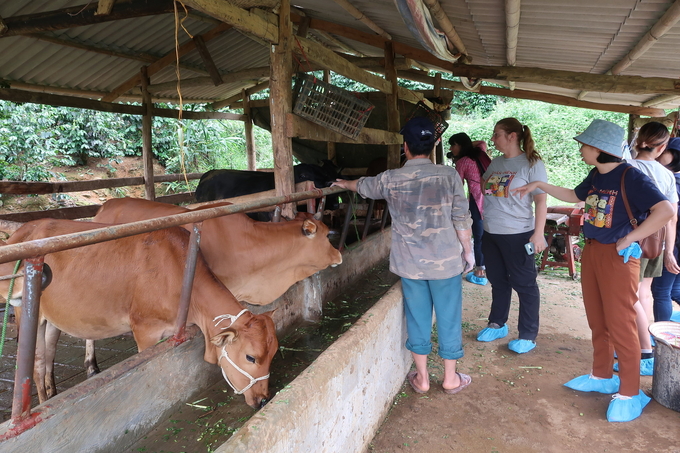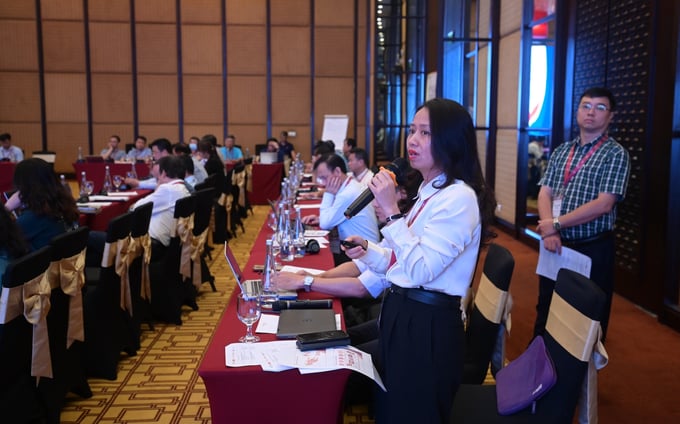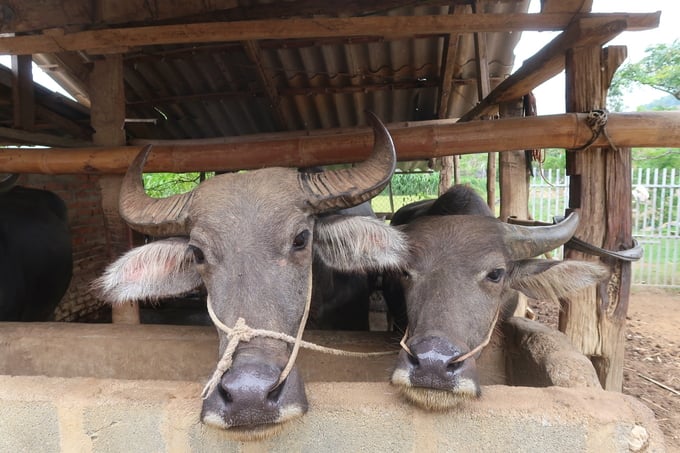May 30, 2025 | 06:24 GMT +7
May 30, 2025 | 06:24 GMT +7
Hotline: 0913.378.918
May 30, 2025 | 06:24 GMT +7
Hotline: 0913.378.918

Vietnam is one of the six key countries involved in the SAPLING Initiative (locally known as Chan Henh). Photo: ILRI.
In Son La province, ethnic minorities make up 83% of the population. The province also has some of the highest rates of poverty, malnutrition, and gender inequality in the country, according to the Consultative Group for International Agricultural Research (CGIAR). Local livelihoods depend heavily on agriculture, particularly small-scale livestock production.
The project "Sustainable Livestock Productivity for Livelihoods, Nutrition and Gender Inclusion" (local name is Chan Henh and international name is SAPLING) is implemented in Mai Son and Phu Yen districts to address the above challenges.
The SAPLING initiative aims to assess trade-offs and demonstrate how improvements in livestock productivity can offer a triple win: generating improved livelihoods and nutritional outcomes; contributing to women’s empowerment; and reducing impacts on climate and the environment.
Speaking at the workshop “From research to policy: Improving animal disease prevention and control in Vietnam” on October 18, Dr. Bui Ngoc Anh from the National Institute of Veterinary Medicine emphasized that the project aims to improve livelihoods by enhancing livestock productivity and market access. This contributes directly to the National Livestock Development Strategy for 2021-2030.
As of 2021, Son La province had a livestock population of 350,000 buffaloes and cattle, 700,000 pigs, and 7 million poultry. However, livestock production in the province faces several challenges, including low productivity and efficiency, poor food safety management, limited market access, and weak competitiveness. Farmers also struggle with limited access to veterinary services and insufficient knowledge of biosecurity measures for preventing and controlling animal diseases.

Dr. Bui Ngoc Anh (National Institute of Veterinary Medicine) shares results from the animal health component of the SAPLING project. Photo: Tung Dinh.
The animal health component of the SAPLING project is led by the Veterinary Institute in collaboration with the Department of Animal Husbandry, Veterinary Medicine, and Fisheries of Son La. Over the past two years, the project has successfully organized training courses for 44 veterinary staff. The trainees reported that the training content was practical and highly relevant, particularly given the ongoing challenges posed by African swine fever and lumpy skin disease in the area.
Many veterinary staff quickly applied the skills they acquired, such as handling large animals, administering vaccines and veterinary drugs, implementing biosecurity practices, and carrying out disinfection procedures. The trainees also expressed interest in participating in future training programs to further enhance their expertise.
The project organized eight training courses for farmers in eight villages within Mai Son district, attracting 204 participants (107 men and 97 women). As a result, 90% of farmers reported improved knowledge of animal diseases and preventive measures. Even farmers who did not attend the training benefited by learning from the practices of those who had participated. Many veterinary staff noted that promoting vaccination campaigns became easier following the training.
To provide ongoing support, the project created eight Zalo groups to connect farmers with veterinary experts, enabling quick responses to questions about animal health, farming techniques, and feed management. These groups have become a valuable resource for farmers, facilitating direct communication with project staff.

The SAPLING project recorded positive results when 7/10 items on biosafety livestock farming were improved. Photo: ILRI.
Following three practical inspection visits, the project team reported significant progress in 7 out of 10 biosecurity indicators, including controlling visitors, providing protective gear, isolating infected animals, controlling pests, cleaning tools, disinfecting and keeping records.
Despite these achievements, the project faces several challenges. The small scale of livestock farming households limits efforts to centralize production, reducing opportunities for economies of scale. Additionally, the prevalence of disease, particularly foot-and-mouth disease and African swine fever, has complicated the implementation and monitoring of demonstration farms.
The limited timeframe for operating these demonstration farms has also made it difficult to observe long-term changes across all intervention criteria.
Veterinarians involved in the project recommend further in-depth research to confirm the positive outcomes observed so far. A new phase of the project is currently being designed and is awaiting approval. This next phase aims to continue supporting farmers and fostering sustainable productivity improvements in the region.
Livestock is a fast-growing, high-value agricultural subsector accounting for 15–80% of GDP in low- and middle-income countries, yet malnutrition remains high in livestock-dependent communities. In Africa and Asia, demand for livestock products is expected to grow 200% by 2030 - an opportunity for hundreds of millions of small- to medium-scale livestock producers to provide nutrient-dense foods for their families, countries and regions.

(VAN) Ms. Nguyen Thi Dung, Deputy Director of Ngoc Hoang Cooperative, shared about the journey of bringing dragon fruit to Europe, achieving annual revenues in the billions of VND.

(VAN) Bamboo products from Thang Tho Bamboo Cooperative have reached many countries around the world, while also creating jobs for local workers.

(VAN) The Management Board of Con Dao National Park reported that a green sea turtle, tagged in the Philippines, has traveled thousands of kilometers to lay 84 eggs on Bay Canh Islet.

(VAN) Green technology is paving a new path for sustainable aquaculture in the Mekong Delta in particular and across the country in general, helping reduce emissions and adapt to climate change.

(VAN) On May 27, La French Tech Vietnam (the French startup and innovation community in Vietnam) held the French Tech Summit Vietnam 2025.
/2025/05/27/4731-2-223159_980.jpg)
(VAN) No votive paper, no styrofoam, no plastic bags, no plastic bottles, and no single-use plastic trays are the key rules tourists should keep in mind when visiting Con Dao.

(VAN) In the fight against plastic pollution, Vietnam has been demonstrating a proactive, pioneering, and active role in addressing the greatest environmental challenge today.